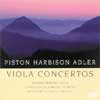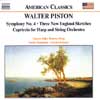Adler; Harbison; Piston Viola Concertos
Vivid snapshots of mid- to late-20th-century Americana from a trio of native composers
View record and artist detailsRecord and Artist Details
Composer or Director: Samuel Adler, Walter (Hamor) Piston, John H. Harbison
Genre:
Orchestral
Label: Albany
Magazine Review Date: 7/2003
Media Format: CD or Download
Media Runtime: 71
Mastering:
Stereo
DDD
Catalogue Number: TROY558

Tracks:
| Composition | Artist Credit |
|---|---|
| Concerto for Viola and Orchestra |
John H. Harbison, Composer
Alexander Vilumanis, Conductor John H. Harbison, Composer Latvian National Symphony Orchestra Randolph Kelly, Viola |
| Concerto for Viola and orchestra |
Samuel Adler, Composer
Alexander Vilumanis, Conductor Latvian National Symphony Orchestra Randolph Kelly, Viola Samuel Adler, Composer |
Composer or Director: Walter (Hamor) Piston
Genre:
Orchestral
Label: Naxos
Magazine Review Date: 7/2003
Media Format: CD or Download
Media Runtime: 52
Mastering:
Stereo
DDD
Catalogue Number: 8 559162

Tracks:
| Composition | Artist Credit |
|---|---|
| Capriccio |
Walter (Hamor) Piston, Composer
Gerard Schwarz, Conductor Seattle Symphony Orchestra Walter (Hamor) Piston, Composer |
| (3) New England Sketches |
Walter (Hamor) Piston, Composer
Gerard Schwarz, Conductor Seattle Symphony Orchestra Walter (Hamor) Piston, Composer |
| Symphony No. 4 |
Walter (Hamor) Piston, Composer
Gerard Schwarz, Conductor Seattle Symphony Orchestra Walter (Hamor) Piston, Composer |
Author: Andrew Farach-Colton
Piston’s Concerto (1957) opens pensively, quickly builds to an aching climax (beginning around 4'00") with the first movement ending almost abruptly on a note of resignation. The central Adagio con fantasia is the work’s emotional core, beginning in abject loneliness (sparely scored with wistful harmonies) but finds, in the final pages, a sweeter lyricism that prepares the listener perfectly for the playful syncopations of the exuberant finale.
Harbison’s Concerto (1989) is if anything even darker in mood, though it’s more luminously scored. The first movement has an improvisatory air (note, for example, the spontaneous-sounding chirping of woodwinds that accompany the viola’s opening solo) that stands in stark contrast with the obsessive character of the brief scherzo-like movement that follows. The composer writes that the concerto ‘moves from inwardness to ebullience and from an ambiguous and shifting harmonic language to tonality’ – a dramatic structure similar to Piston’s.
Of the three concertos, Adler’s will likely be the most immediately appealing, its contrapuntal intricacies offset by some strikingly tuneful melodies. It’s also a vividly coloured piece, with a fine balance of light and shade. The Concerto was composed for Randolph Kelly, principal violist of the Pittsburgh Symphony, who premièred the work in 2000. I only wish that it would have been possible to have the PSO for this recording. The Latvian National Orchestra plays well under Alexandrs Vilumanis – particularly in the Harbison, which is given a suitably intense performance – but there are a few small but distracting lapses in ensemble in the Adler, and the recording quality is a bit hazy. Nevertheless, these are all significant and richly rewarding works, and the disc is strongly recommended.
Those unfamiliar with Piston’s work should also investigate a Naxos disc that repackages performances originally issued on Delos, for whom. Gerard Schwarz recorded three discs worth of Piston’s music in the ’90s. This one is arguably the best of the lot as it features the Fourth Symphony (1951) and the Three New England Sketches (1959), two of the composer’s greatest and most attractive scores.
The Fourth’s rollicking syncopations show that Piston had been listening closely to Copland’s ballets. This is a symphony in the true sense, though, and its musical ideas are as lucidly argued, profoundly uttered and strongly structured as any in the classical repertoire. Perhaps the surface dissonance of ‘Seaside’, the first of the Sketches, might be off-putting to some, but I can’t see how anyone could resist the exquisite colours Piston conjures up. ‘Summer Evening’, with its flitting, twittering evocation of insect activity, is as vivid as the best of Mendelssohn’s scherzos, and the craggy majesty of ‘Mountains’ is truly awesome.
The original Delos disc included a performance of the Serenata by the New York Chamber Symphony that is missing in this re-release. We do still get the delightfully atmospheric Capriccio for Harp and Strings, however, and the quality of both the performances and recorded sound is as impressive as ever. At budget price, the disc should be utterly irresistible.
Discover the world's largest classical music catalogue with Presto Music.

Gramophone Digital Club
- Digital Edition
- Digital Archive
- Reviews Database
- Full website access
From £8.75 / month
Subscribe
Gramophone Full Club
- Print Edition
- Digital Edition
- Digital Archive
- Reviews Database
- Full website access
From £11.00 / month
Subscribe
If you are a library, university or other organisation that would be interested in an institutional subscription to Gramophone please click here for further information.




